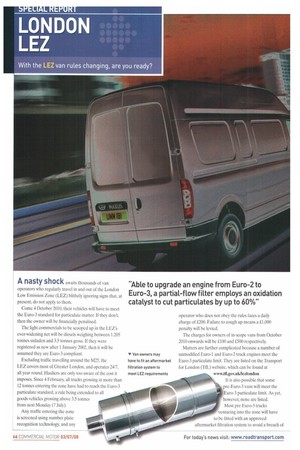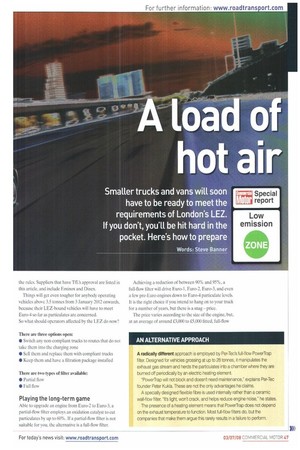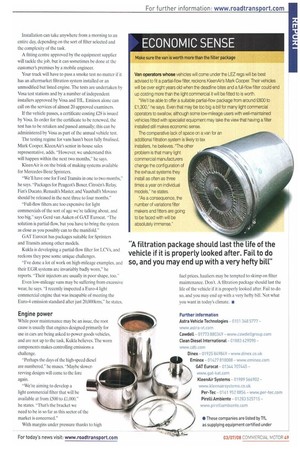"Able to upgrade an engine from Euro-2 to Euro-3, a
Page 46

Page 47

Page 48

Page 49

If you've noticed an error in this article please click here to report it so we can fix it.
partial-flow filter employs an oxidation catalyst to cut particulates by up to 60%"
A nasty shock awaits thousands of van operators who regularly travel in and out of the London Low Emission Zone (LEZ) blithely ignoring signs that, at present, do not apply to them.
Come 4 October 2010, their vehicles will have to meet the Euro-3 standard for particulate matter. If they don't. then the owner will be financially penalised.
The light commercials to be scooped up in the LEZ's ever-widening net will be diesels weighing between 1.205 tonnes unladen and 3.5 tonnes gross. If they were registered as new after 1 January 2002, then it will be assumed they are Euro-3 compliant.
Excluding traffic travelling around the M25. the LEZ covers most of Greater London. and operates 2417, all year round. Hauliers are only too aware of the cost it imposes. Since 4 February, all trucks grossing at more than 12 tonnes entering the zone have had to reach the Euro-3 particulate standard, a rule being extended to all goods vehicles grossing above 3.5 tonnes from next Monday (7 July).
Any traffic entering the zone is screened using number plate recognition technology, and any operator who does not obey the rules faces a daily charge of £200. Failure to cough up means a £1,000 penalty will be levied.
The charges for owners of in-scope vans from October 2010 onwards will be £100 and £500 respectively. Matters are further complicated because a number of unmodified Euro-1 and Euro-2 truck engines meet the Euro-3 particulate limit. They are listed on the Transport for London (TfL) website, which can be found at wwvv.tfl.govaddlezIondon It is also possible that some pre-Euro-3 vans will meet the uro-3 particulate limit. As yet, however, none are listed.
Most pre Euro-3 trucks venturing into the zone will have to be fitted with an approved aftermarket filtration system to avoid a breach of the rules. Suppliers that have TfL's approval are listed in this article, and include Eminox and Dinex.
Things will get even tougher for anybody operating vehicles above 3.5 tonnes from 3 January 2012 onwards, because their LEZ-bound vehicles will have to meet Euro-4 so far as particulates are concerned.
So what should operators affected by the LEZ do now?
There are three options open: • Switch any non-compliant trucks to routes that do not take them into the charging zone • Sell them and replace them with compliant trucks • Keep them and have a filtration package installed There are two types of filter available: • Partial flow • Full flow
Playing the long-term game
Able to upgrade an engine from Euro-2 to Euro-3, a partial-flow filter employs an oxidation catalyst to cut particulates by up to 60%. If a partial-flow filter is not suitable for you, the alternative is a full-flow filter. Achieving a reduction of between 90% and 95%, a full-flow filter will drive Euro-1, Euro-2, Euro-3, and even a few pre-Euro engines down to Euro-4 particulate levels. It is the right choice if you intend to hang on to your truck for a number of years, but there is a snag — price.
The price varies according to the size of the engine, but, at an average of around £3,000 to £5,000 fitted, full-flow costs significantly more than partial-flow. The latter are approximately £1,000 to £1,500 cheaper, and are usually more compact and simpler and quicker to fit.
Go down the full-flow route and you have the choice of two different systems one that employs a platinum oxidation catalyst, possibly combined with a catalytic coating on the surface of the ceramic wall-flow filter itself, to burn off the particulates, or one that uses a fuel-borne catalyst to achieve the same goal.
Boosting fuel economy
Select the fuel-borne catalyst and you'll have to top up a small tank with an additive that is a mixture of iron, cerium and platinum. It does bring benefits other than a cleaner exhaust, says John Chadderton, managing director of Astra Vehicle Technologies. "There is a more complete burn in the cylinder, so you get better fuel consumption," he explains. "And you get a cut in gaseous emissions, as well as reduced particulates."
While anything that improves fuel usage has to be counted as a benefit, the mixture costs a hefty £27.50 a litre; and a litre is used for every 2,200 litres of fuel consumed.
That is cheap, though, when you compare it with the additive required by Clean Diesel International's Purifier e4 fuel-borne catalyst full-flow filter. That costs an even more painful £45.00 a litre, and a litre will be used up every time 3,000 litres of diesel is burned.
"It can boost fuel economy by as much as 5%," says Dan Skelton, commercial director for Europe.
Supporters of full-flow filters that employ fuel-borne catalysts also argue they function more effectively in stop-start traffic than those that do not.
What's the situation with vertical exhausts? Fitting a filter to one does not usually present any problems, says Mike Galey, marketing director at Eminox.
-We've installed lots of them, we haven't experienced any difficulties, and they take no longer to fit than a system for a conventionally-positioned exhaust does," he says.
It can take anywhere from two weeks to close to eight for a filtration package to be shipped to a fitting centre and installed. The wait can be extended to as long as 12 weeks if the truck concerned is a special model produced in small volumes, and additional design work is required to ensure the filter fits. Installation can take anywhere from a morning to an entire day, depending on the sort of filter selected and the complexity of the task.
A fitting centre approved by the equipment supplier will tackle the job, but it can sometimes be done at the customer's premises by a mobile engineer.
Your truck will have to pass a smoke test no matter if it has an aftermarket filtration system installed or an unmodified but listed engine. The tests are undertaken by Vosa test stations and by a number of independent installers approved by Vosa and TfL. Eminox alone can call on the services of almost 20 approved examiners.
If the vehicle passes, a certificate costing £28 is issued by Vosa. In order for the certificate to be renewed, the test has to be retaken and passed annually; this can be administered by Vosa as part of the annual vehicle test.
The testing regime for vans hasn't been fully finalised. Mark Cooper, KleenAir's senior in-house sales representative, adds. "However, we understand this will happen within the next two months," he says.
Kleen Air is on the brink of making systems available for Mercedes-Benz Sprinters.
"We'll have one for Ford Transits in one to two months,he says. "Packages for Peugeot's Boxer, Citroen's Relay, Fiat's Ducato, Renault's Master, and Vauxhall's Movano should be released in the next three to four months."
"Full-flow filters are too expensive for light commercials of the sort of age we're talking about, and too big," says Gerd van Aaken of GAT Eurocat. -The solution is partial-flow, but you have to bring the system as close as you possibly can to the manifold."
GAT Eurocat has packages suitable for Sprinters and Transits among other models.
Kukla is developing a partial-flow filter for LCVs, and reckons they pose some unique challenges.
"I've done a tot of work on high-mileage examples, and their EGR systems are invariably badly worn," he reports. "Their injectors are usually in poor shape, too."
Even low-mileage vans may be suffering from excessive wear, he says. "I recently inspected a Euro-4 light commercial engine that was incapable of meeting the Euro-4 emission standard after just 20,000krns," he states.
Engine power
While poor maintenance may be an issue, the root cause is usually that engines designed primarily for use in cars are being asked to power goods vehicles, and are not up to the task, Kukla believes. The worn components makes controlling emissions a challenge.
"Perhaps the days of the high-speed diesel are numbered," he muses. "Maybe slowerrevving designs will come to the fore again, "We're aiming to develop a light commercial filter that will be available at from £500 to £1,000," he states. "That's the bracket we need to be in so far as this sector of the market is concerned."
































































































































































